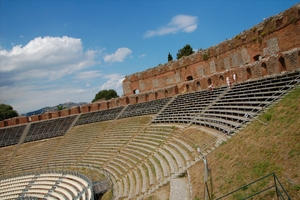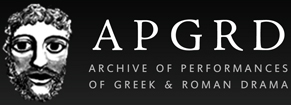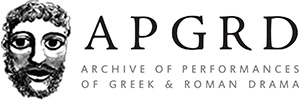
Seeing a Greek tragedy performed in English, let alone in the ancient Greek, may sound like hard work to many nowadays. But for the first audiences of plays like the Agamemnon, Medea and Bacchae, the theatre was the ancient equivalent of Hollywood – mass entertainment and big business. The early Greek comedies too, such as Aristophanes’ Frogs, had huge appeal, combining slapstick, literary parody (particularly of tragedy), not to mention a ‘Have-I-Got-News-For-You’ style treatment of politics and politicians.
The highlight of the dramatic calendar in the fifth century BC was the ‘City Dionysia’ held in Athens every year at the beginning of spring. This festival in honour of the god Dionysus lasted about a week, and over half of that time would be dedicated to back-to-back theatrical performances – up to seventeen plays over the course of four days. During that time audiences would be swept away by the rhetoric of heroes, would marvel at the coordinated dance and song of the choruses, have their sides split by the japery of comic actors and their aesthetic appetites indulged by the whole lavish spectacle.
The theatre in democratic Athens was a forum for exploring the most contentious of political issues. For the duration of the festival law courts would be closed, governmental and municipal business suspended and people who lived in the neighbouring rural townships would leave their agricultural tasks and flock to the city. The Athenian prisons would even release inmates for the duration of the festival so that they could attend the processions, plays and sacrifices.
In the days leading up to the festival, the whole city would be buzzing with excitement. Workmen brought in by the cartload would begin building the rows and rows of wooden benches on the southern slope of the Acropolis (there was no permanent theatre in Athens until the mid-fourth century). Merchants would trundle in from out of town to set up their stalls selling food, ‘sacred’ objects and other festival wares, while behind closed doors, boys and young men would be obsessively going over their words and walking through their steps in preparation for their performances. On stage in front of anything between six and twelve thousand spectators, there was nowhere to hide if you missed a beat.
The City Dionysia was also something of a PR exercise for the Athenians. They would be able to show off their dramatic prowess but the processions and ceremonies that preceded the performance days also honoured the bravery of their fallen soldiers, revelled in the splendour of the city’s buildings and publicly displayed their wealth. Visiting delegates from tribute-paying allied cities were given seats of honour in the theatre so that they might better observe the power of their ‘mother’ city.
Although the deaths of Sophocles and Euripides in 406 BC were felt keenly throughout Greece, theatre continued to grow and evolve. If anything, theatre became more popular and, as it spread beyond Athens and rural Attica, was increasingly important for the Greek economy. In contrast to the somewhat ambiguous status of actors for much of history, actors in fourth-century Greece were well-respected artistes and celebrities, in demand and obscenely well paid. Long before Angelina Jolie ever became a Goodwill ambassador for the UN, actors like Neoptolemus and Aristodemus were performing the duties of ambassador and promoting peace between the warring nations of Athens and Macedon.
In a way lost to us now, going to the theatre in the ancient Greek world was a communal activity and one that was hard-wired into the social, political and religious rhythms of the ancient city. But for all the differences, we can still find those moments on the modern stage when the spirit of ancient theatre lives and long-dead poets speak once more.


